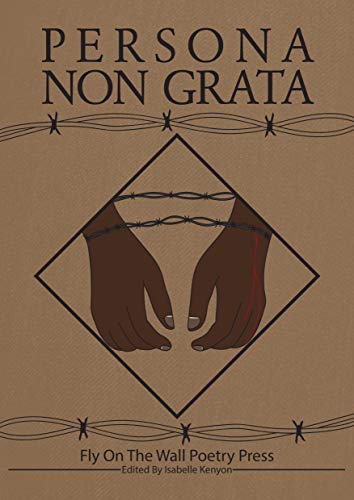|
Persona Non Grata Edited by Isabelle Kenyon Fly on the Wall Poetry Press 2018 ISBN: 978-1-9995986-1-7 90 Pages “Persona Non Grata,” a poetry anthology edited by Isabelle Kenyon and published by her Fly on the Wall Poetry Press, asks readers, within 55 poems, to enter into deep union with the unwelcomed, misunderstood other. The result is a multi-faceted jewel of a book, where beauty emerges, repeatedly and unexpectedly, from the grime. Each section of the book explores some form of social isolation, giving powerful voice to outsiders. Be they homeless, refugees, immigrants, victims of war, individuals who are walking the slow, lurching path of grief or chronic illness, or the disenfranchised, it’s often easy to believe these others are not like us. Poetry, however, values the individual and revels in the unique experience of each living creature. The beauty of “Personal Non Grata” is that it never backs down from the work of seeing and valuing the countless precious details of the people and stories it presents. In “Limousine Baby,” Patrick Williamson gives voice to someone who starts off mysterious, and then, increasingly, becomes painfully desperate: “she took some coke baby did now she’s stoked up so high her eyes are pinballs she said this way you don’t feel nothing…” David Mark Williams uses the image of a decaying car to express the plight of the homeless in his poem “Derelict”: “Wrecked car, ridden with joy and fired to skeleton, gifted to the wood’s heart, let the weather shape it now.” This line, from Richard Archer’s “Displacement” haunts: “I came here from that land that what was once called a cradle but is now a mass grave.” Among the most compelling is “It Began with Water,” by Shirley Luke, which opens, “It began with water. It began with bodies in the water. It began with African bodies in the water. It began with dead African bodies in the water.” Luke continues with imagery and a linguistic structure that expresses the breath-sucking, bone-deep, painful way slavery slays and lashes both the bodies of those who experience its atrocities and the fabric of the entire human race. In “Holocaust,” Debbie Walsh writes, “we stood gazing gaping as they shifted From parents to corn stalks.” This harrowing story of a child tending to a younger brother is unforgettable. It’s good to remember that we are far more alike than we are different, and that the things many people believe make them worthy are often pure illusion. Wilda Morris puts it this way with wry humor in her poem, “The Banquet:” “When we enter the gates of heaven, if there is a hereafter somewhere beyond time and space, the custodian will sit near the left hand of the Almighty; the man at the shoeshine stand who polishes dusty footwear will kneel at the feet of his saviour and be raised up to a place at the messianic banquet...” This kind of literature inspires action and changes hearts at a time when it is sorely needed. Fly on the Wall Poetry Press walks the talk. Funds raised by the sales of Persona Non Grata will go to charities that support people facing homelessness, poverty, disaster, war, and oppression around the world. amzn.to/2D0rXlxXlx Amy Alexander is a writer and artist who lives in Baton Rouge, Louisiana, near the Mississippi River. Her work has appeared in Memoir Mixtapes, Ghost City Review, Cabinet of Heed, The Mojave He[art] Review and several other brilliant publications. Look for her art and poetry book, The Legend of the Kettle Daughter, in 2019 from The Hedgehog Poetry Press. Comments are closed.
|
AuthorWrite something about yourself. No need to be fancy, just an overview. Archives
April 2024
Categories |

 RSS Feed
RSS Feed
